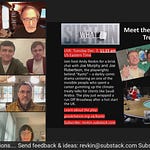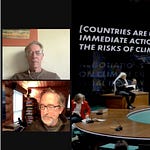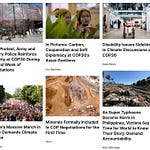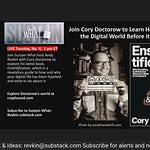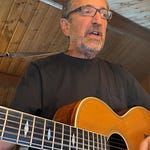This evergreen Sustain What conversation on trust and mistrust in climate science and scientists is - sadly - more relevant than ever. It was organized early in the pandemic by Gil Eyal, a sociologist at Columbia University focused on attitudes toward expertise (he literally wrote the book on this - The Crisis of Expertise).
Instead of running this Sustain What show, I was one of three discussants, along with the Cambridge climate-policy researcher Mike Hulme (author of Why We Disagree on Climate Change) and the Harvard historian of science and climate campaigner Naomi Oreskes, who had recently authored Why Trust Science?
Now we’re in an era when a government agency with life-or-death responsibilities is led by a figure who’s built a big following by actively attacking expertise. I was blown away by this tweet by Health and Human Services Secretary Robert F. Kennedy, Jr. - someone I used to go camping with (pre brain worm). What times these are….
This was the brief for our discussion:
Over the last three decades, the debate about climate change has involved challenges to the very evidence of change, disagreements about status of models and simulations as scientific evidence, calls for “sound science,” disputes about the contribution of anthropogenic causes, attempts to cast doubt on the integrity and plausibility of forecasts and assessments, and various forms of “solution aversion.”
What are the sources of skepticism about climate change and/or mistrust of climate science? What processes, mechanisms and dynamics are implicated in provoking and prolonging the debate about climate change? To what extent are these specific to the climate debate, and to what extent they are representative of a broader mistrust in experts?
What can be done to increase trust in climate science or consensus around appropriate measures or interventions?
The many flavors of “misinformation”
A big part of the trust tussle over consequential issues is to see who gets to define what is “misinformation.”
I was reminded of my old conversation when I listened to a fascinating and worthwhile discussion of related issues by
, editor of , and , an assistant professor of philosophy at the University of Sussex who writes the Conspicuous Cognition newsletter, in which he explores the intersection of culture and politics with philosophical insights and scientific research and expertise.Here’s one section (from Mounk’s transcript) that shows the relevance to our climate-trust discussion above and also to another conversation I had with Mike Hulme about his most recent book on what he calls “climatism” (putting climate change in the foreground in discussing almost any pressing issue, even when other factors are the dominant drivers of the problem):
Mounk: What about this idea of elite misinformation? I think it’s a very nice phrase that I believe Matt Yglesias first came up with. At least he wrote one of the first big articles about that. How common is that? Again, obviously you’re skeptical about how useful term misinformation is in general, but if we take this broader definition of misinformation that perhaps is not very coherent, but which has sort of entered the political lexicon, do you think it’s obvious that political elites, social elites more broadly, are systematically better at avoiding that kind of misinformation than others? Or is this problem of elite misinformation, which Matt posited, a very serious one?
Williams: Just to say one thing on that terminological issue. I mean, I don’t have any issue with ordinary democratic citizens or journalists or pundits in their capacity as democratic citizens applying a term like misinformation with a kind of expansive meaning like Yglesias does in that article. My issue is when it comes to misinformation experts and policymakers who are applying this classification either to establish objective scientific findings about it or to enforce certain kinds of anti-misinformation policies. That’s where I think it’s very important to have a strict clear-cut definition. But on that point of elite misinformation, it’s just obviously true that within our mainstream knowledge-producing institutions, whether it’s science, whether it’s academia more broadly, whether it’s elite legacy media outlets, there is a lot of false and misleading communication. If you take a topic like climate change, for example, almost all of the focus on climate misinformation has focused on, in the broadest possible sense, climate denial. That’s almost exclusively associated with the political right, where people have called into question the existence of human-driven climate change or the risks that it poses. I completely agree that that phenomenon exists and I think it is dangerous and I think it’s important that people think carefully about why that exists and ways to address it.
But there’s also a lot of what you might call elite progressive misinformation. So the philosopher
had a really fantastic article on his Substack recently about what he calls “highbrow climate misinformation,” looking at the ways in which there’s lots of what you might call alarmist climate viewpoints on the sort of mainstream progressive side of the aisle which are simply not well-supported by empirical evidence, or they involve forms of communication that are not supported by empirical evidence, and which almost never get called out as misinformation.
If you’ve followed me through the years, you already know that I’ve spent an awful lot of time trying to bat down what Mounk, Williams and Heath describe as “elite” or “highbrow” climate misinformation even as I’ve fought to expose professional purveyors of climate and energy falsehood in service of maintaining the fossil-fueled status quo. Here’s just one of dozens of relevant Dot Earth posts from back in the day
Coincidentally,
’s Sunday post has this related line about science being the process of nibbling away at what “experts” have concluded to be the state of things:In his book The Pleasure of Finding Things Out, Richard Feynman writes that “Science is the belief in the ignorance of experts.” I used to hate this quote for its entreaty to conspiratorial thinking. After all, if scientists automatically distrusted every expert opinion, how would truths coalesce? How would knowledge accumulate over time? Wouldn’t we all just claim our own private reality in the face of expertise? But it’s the following lines from Feynman that make his point clear. “When someone says 'science teaches such and such', he is using the word incorrectly. Science doesn't teach it; experience teaches it.” In other words, science is the opposite of blind faith. It is a reflexive skepticism toward received wisdoms or arguments from authority. It is the conviction that our own experiments, if carefully constructed, can reveal once-obscured truths. Science is a special kind of faith—a belief before evidence that the previous generation’s “truths” are, at best, half-truths, with half-lives, which will one day pass away and make room for the next generation of even more useful half-truths.
Two papers published last year are worth highlighting here:
Investigating the trust gap between scientists and climate scientists in 68 countries
The abstract:
Across 68 countries (N = 69,534), individuals expressed less trust in climate scientists than scientists in general. In most countries and overall, conservative political orientation was more strongly associated with lower trust in climate scientists than with trust in scientists in general.
Cathleen O’Grady, writing in Science Magazine, summarized the implications:
Climate scientists, on average, are less trusted around the world than scientists in general, according to a preprint posted to the Open Science Framework last month. That lack of trust could weaken support for government actions to avert catastrophic global warming, researchers say.
Trust in climate science and climate scientists: A narrative review
Naomi Oreskes was an author. Here’s the conclusion:
[A] large share of national publics perceive climate scientists and climate science as trustworthy. However, trust in climate science is politically polarized, particularly in the U.S., where conservatives have lower levels of trust than liberals. Distrust in climate science can be politically consequential and should be taken seriously, even if exhibited by only a minority of the public. We identify several reasons that lead some audiences to be distrustful or skeptical about the competence, integrity, benevolence, and openness of climate scientists–four key dimensions of trustworthiness. Given the narrative style of this review and the continuously developing research on trust in climate science, we invite more systematic reviews on the topic which could help to identify potentially overlooked correlates of (dis)trust in climate science. We find no clear evidence that respectful advocacy by climate scientists negatively affects trustworthiness perceptions. However, the effect of advocacy on perceived trustworthiness seems to be dependent on the policy in question. We provide several recommendations that can help climate change communicators become more trustworthy.
Nine years ago, in a lecture to a geochemstry society, I described the challenge facing scientists who want to help society change direction on climate by juxtaposing a scene from the 1955 film “Rebel Without a Cause” with the release of one of the IPCC’s reports (full video here):
The ideal soundtrack when exploring these issues is T Bone Burnett’s 1980 album Truth Decay, particularly his song “Madison Avenue”:







